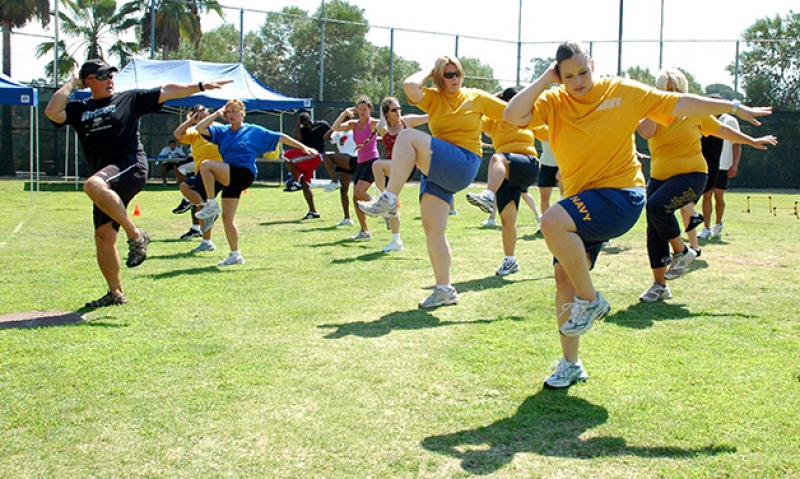
The U.S. Armed Forces are facing a serious challenge on the recruiting front — the bulging waistlines of America’s recruiting-age population.
The U.S. Armed Forces are facing a serious, long-term challenge on the recruiting front – one that cannot be overcome by bonuses or promises of college scholarships. In fact, this challenge is beyond the military’s control, but could jeopardize its ability to defend the country. It’s the challenge posed by the bulging waistlines of America’s recruiting-age population.
"Of 32 million 17- to 24-year-olds, 3.2 million of them are childhood obese – that’s 10 percent," according to Lt. Gen. Benjamin Freakley, commanding general of U.S. Army Accessions Command. "Several years ago, one in 20 Americans was obese, but that’s closing in soon on one in four."
Simply put, those bulging waistlines significantly shrink the pool of those fit for military service. Many overweight teens and 20-somethings suffer from childhood diabetes; some have bone-mass issues. These problems lead to a host of other health problems, as the Armed Forces Press Service has reported. One Pentagon official notes that many teens are unable to perform sit-ups and pull-ups; some aren’t even able to jog.
The epidemic of childhood obesity is the result of a confluence of factors: video games, the Internet, hand-held gaming devices and the like conditioning children to a sedentary lifestyle; cuts in athletic programs at the grade-school and high-school levels; and the ready availability of cheap, high-calorie fast food.
Regardless of the cause, here are the consequences: In 1987, 6 percent of Americans between 18 and 34 were obese; in 2008, that number had jumped to 23 percent, as Army Times reports.
But the consequences are on display inside the military as well. The number of U.S. troops diagnosed as obese or overweight has more than doubled since 2003, USA Today reports. From 1998 to 2002, less than two military personnel out of 100 were deemed overweight. Since 2003, one out of 20 have been diagnosed as "clinically overweight."
According to the Pentagon’s Medical Surveillance Monthly Report (MSMR) for January 2011, "In 1995, 5 percent of active servicemembers were considered ‘obese.’" By 2008, that number had increased to 13 percent. Between 1998 and 2010, the number of "active-duty component members who received at least one overweight/obesity-related diagnosis more than tripled." (The full report is available here: bit.ly/urhA6A)
In fact, the military discharges some 1,200 enlistees annually for being overweight. That’s a staggering figure, especially when considered alongside this one: During World War II, as an NPR report recently pointed out, "40 percent of potential military recruits were undernourished."
How far we’ve come: Not long ago, we were too frail and too feeble to fight; now we are too fat.
The MSMR notes matter-of-factly that the "increase of obesity in the general population is reflected in higher [body mass indexes] and more ‘medically unfit for service’ rejections among civilian applicants for military service …The U.S. military is significantly affected in many ways by the obesity epidemic among young-adult Americans in general." That makes perfect sense. After all, the U.S. military really only has one pool from which to draw: the U.S. population.
The military is responding in creative ways. The Missouri National Guard, for example, developed the Warrior Spirit Training Program in 2010, a two-week training course that provides guidance in nutrition and fitness. It helps participants to develop structured, healthy habits; identify and understand overeating "triggers"; create self-monitoring programs; change behaviors and lifestyle; manage stress; and guard against "emotional eating."
One soldier told the St. Louis Post-Dispatch that the Warrior Spirit program helped him lose 35 pounds – and keep it off. The key for him was cutting back on fast food, eliminating sugary sodas and increasing his level of physical activity.
Structure House, a weight-management treatment facility in Durham, N.C., helped design elements of the Warrior Spirit program. The Missouri Guard also received support from the Army Physical Fitness Research Institute, Fort Leonard Wood Hospital and local health agencies.
"As it turns out, the National Guard is no different than the civilian population," according to Lee Kern of Structure House. "They are gaining weight and becoming unfit, and for some members it is jeopardizing their careers and/or prospects for advancement. The good news is they have decided to do something about it."
Retired Gen. Barry McCaffrey has called the military’s obesity problem "a matter of national security." He warns that "If thousands of young men and women are too overweight to enlist – or become too obese to continue their service – we will have a true crisis on our hands."
If the MSMR numbers are any indication, the crisis is already here.
- Landing Zone

